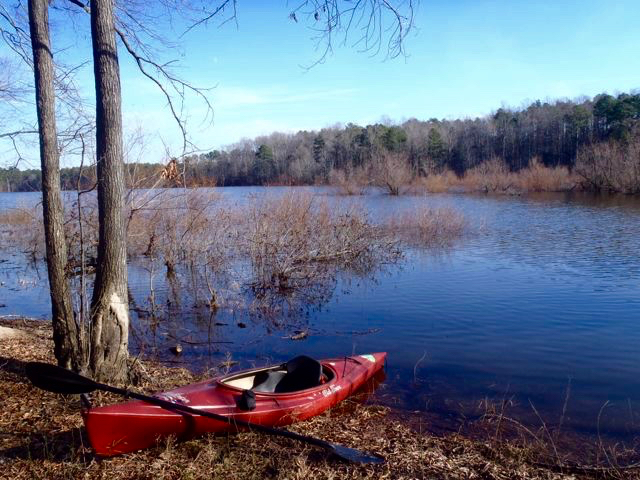
It is the escape I keep in my back pocket in winter, the one I turn to when the need to truly give civilization the slip is greatest.
The winter paddle.
I discovered the power of the winter paddle in 2004. That October, I had done Cycle North Carolina, the week-long bike ride across North Carolina. We started in Sparta, in the Blue Ridge mountains, and pedaled, over seven days, to Oriental on the coast. It was one of the few CNC’s blessed with great weather throughout: highs in the 70s, cloudless skies, hours of thought-free pedaling through the Piedmont plateau, then on to the coastal plain. It was a week of outdoor bliss and one, not surprisingly, that resulted in a bit of melancholy afterward.
One Wednesday in early December the sky was a brilliant blue, the air still and cold. Hooky immediately entered my mind, but instead of a hike or mountain bike ride, both more suitable to the conditions, my thoughts turned to my Old Town Loon 100, dubbed Cardinal Loon for its rich red color. Cardinal Loon had been hanging in the gear shed for much of the year, my free time consumed with the bike and getting in shape for my cross-state ride. I cobbled together some cold weather paddling gear — rain pants, a wool top, wind-block cycling gloves, hat, thick wool socks, old sneakers — strapped the boat to the roof and headed to the Beaverdam area of Falls Lake.
Beaverdam is a study in what to look for in an open water winter paddling destination, because:
- It’s segregated from the rest of Falls Lake and motorboats (save those with 5 hp engines or less) are prohibited. Surfing boat-generate wakes can be fun in summer, when the spray is refreshing, the thought of capsizing not mortifying. Only a strong wind whips up the water at Beaverdam.
- A forested shoreline offers protection from westerly winds should they kick up.
- There’s good boat access. A sandy beach makes for easy, if not completely dry, put-in.
- There’s ample paved parking. No worry of an off-kilter roadside parking spot where the prospects for getting stuck are above average.
- The paddling gradually narrows: with Falls Lake being a finger reservoir, like most in the Piedmont, passage becomes more intimate, intriguing as you paddle on. This is an especially welcome trait at reservoirs that cater to motorboats: Jordan Lake, Kerr Reservoir, Lake Norman among them. Most boat accesses are at points that provide quick access to the main channel — which is where the majority of power boats head. Head the opposite direction, though, and you’ll likely head away from the lake’s palm and up to one of its fingertips: if you’re lucky, that would be a long, slender, tapering finger restricting passage to bigger, bulkier, brasher boats.
* * *
I put in and paddled north. There was a mild but persistent (and cold) wind out of the northwest, so I stuck close to that western shore. I settled into a vigorous rhythm, enjoying the steady slap of water against Cardinal Loon’s hull, enjoying the release that comes from a good workout. I kept it up knowing the pace would only need to last for a mile and a half. As I passed under the Old Weaver Trail overpass my pace relaxed. For another mile or so, willow groves began to encroach from both banks. Gradually, the isolated pockets began to coalesce, lake became wetlands, passages became tighter and tighter. Some would constrict, then open into a large pool; most would simply clamp down into an impassable tangle.
Eventually, according to the map, this finger reverts into the three creeks that feed it: Robertson, Beaverdam and Smith. Assuming the namesake to be the most substantial, I set out to find the mouth of Beaverdam Creek.
Later, comparing notes, I would learn that Beaverdam Creek could be found, but only when the lake level was up and the stumps and downfall that otherwise restricted travel no longer an issue. On this day I was subject to a series of false starts and comical finishes. After the fourth such thwarted probe, I simply stopped where I was, surrendered the paddle, laid back and let the sun, unimpeded by the lack of canopy overhead, work its magic. The boat rocked slightly, the wind played a winter melody through the willow branches: I may have been on the fringe of a metropolitan area, but I was about as far away as I could get. It was where I wanted to be, where I needed to be.
It was where I go when I need to true winter escape.
